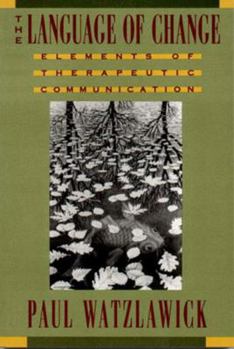The Language of Change: Elements of Therapeutic Communication
Select Format
Select Condition 
Book Overview
Although communications emerging in therapy are ascribed to the mind's unconscious, dark side, they are habitually translated in clinical dialogue into the supposedly therapeutic language of reason and consciousness. But, Dr. Watzlawick argues, it is precisely this bizarre language of the unconscious which holds the key to those realms where alone therapeutic change can take place.
Dr. Watzlawick suggests that rather than following the usual procedure of interpreting the patient's communications and thereby translating them into the language of a given psychotherapeutic theory, the therapist must learn the patient's language and make his or her interventions in terms that are congenial to the patient's manner of conceptualizing reality. Only in that way, he shows, can the therapist effectively bring about genuine changes and problem resolutions. Drawing on the work of Milton H. Erickson, he supports his findings with many (and often amusing) examples.
This book, then, is a virtual introductory course to the grammar and language of the unconscious.
Dr. Watzlawick suggests that rather than following the usual procedure of interpreting the patient's communications and thereby translating them into the language of a given psychotherapeutic theory, the therapist must learn the patient's language and make his or her interventions in terms that are congenial to the patient's manner of conceptualizing reality. Only in that way, he shows, can the therapist effectively bring about genuine changes and problem resolutions. Drawing on the work of Milton H. Erickson, he supports his findings with many (and often amusing) examples.
This book, then, is a virtual introductory course to the grammar and language of the unconscious.
Format:Paperback
Language:English
ISBN:0393310205
ISBN13:9780393310207
Release Date:July 1993
Publisher:W. W. Norton & Company
Length:186 Pages
Weight:0.45 lbs.
Dimensions:0.6" x 5.5" x 8.2"
Customer Reviews
3 ratings
Wonderful!
Published by Thriftbooks.com User , 21 years ago
In this book, the author explains the relationships between consciousness, the brain, and interpersonal communication in a wonderful manner. The part about the analog and digital nature of human functioning and how it relates to human interaction and consciousness was especially interesting to me. If you are interested in the nature of communication and dysfunctions caused by the hidden but logical traps we set up for each other by the way we communicate with each other, give this book a try. If you'd like to understand more about communication and interpersonal relationships, I suggest "The Ever-Transcending Spirit" by Toru Sato. It has so many interesting insights about human relationships, it is totally amazing! Just give these books a try. I think it might change your life in a profound way.
Very Enlightening!
Published by Thriftbooks.com User , 22 years ago
Don't be discouraged if it's a little hard to read at the beginning. After you get past those first chapters, it will get better. For me, it got so interesting I could barely put it down! It sheds lights on several things for me and the most hopeful things is the examples of how therapy doesn't have to take a long time! The examples of how language of change can quickly yield results will blow your mind away! Highly recommended!---For OCD, I also recommend Brain Lock!.
Principles in Changing Language
Published by Thriftbooks.com User , 25 years ago
Dr. Paul Watzlawick's book of change and communication, largely based on the work of Milton H. Erickson, dives right into the theories of the left and right hemispheric patterns in humans. Then discusses the language patterns of schizophrenics. These two major themes when studied and practiced yields a result of change. Watzlawick understands both that: all people have a set of language patterns; and secondly all people are using their brain when they speak. Knowing this will able the reader to speak effectively to a schizophrenic, or just about anyone in a theraputic sense which will allow change in individuals. This book is easy to read with a lot of information with a wonderful conclusion. Highly reccomended for those working in clinical psychology or just looking to change your self.






